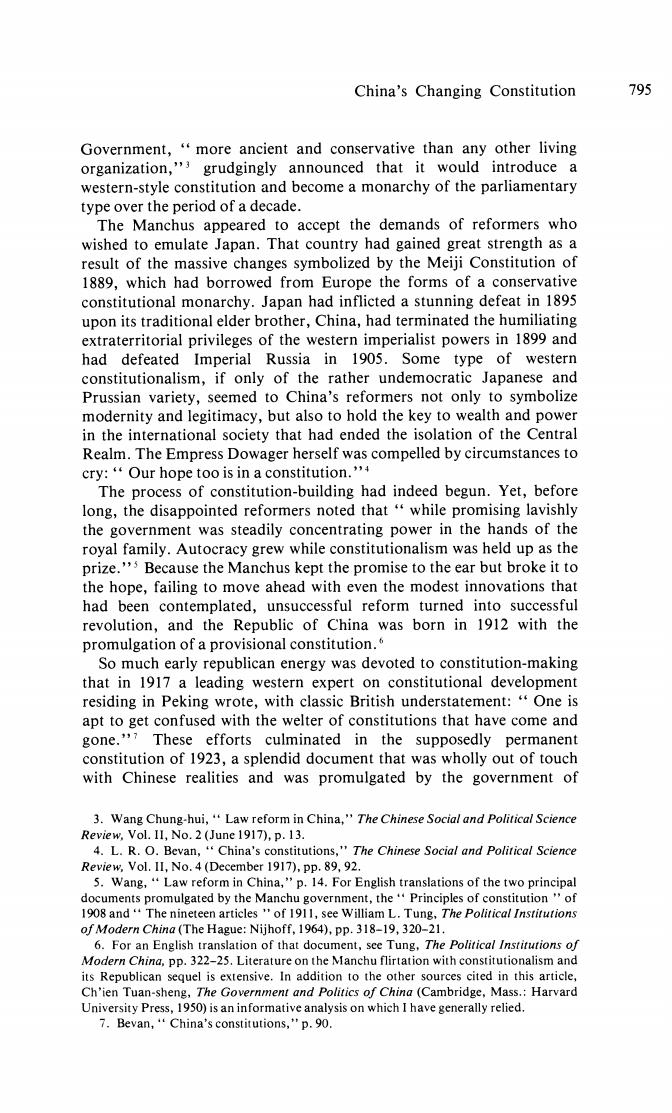正在加载图片...

China's Changing Constitution 795 Government,"more ancient and conservative than any other living organization,"grudgingly announced that it would introduce a western-style constitution and become a monarchy of the parliamentary type over the period of a decade. The Manchus appeared to accept the demands of reformers who wished to emulate Japan.That country had gained great strength as a result of the massive changes symbolized by the Meiji Constitution of 1889,which had borrowed from Europe the forms of a conservative constitutional monarchy.Japan had inflicted a stunning defeat in 1895 upon its traditional elder brother,China,had terminated the humiliating extraterritorial privileges of the western imperialist powers in 1899 and had defeated Imperial Russia in 1905.Some type of western constitutionalism,if only of the rather undemocratic Japanese and Prussian variety,seemed to China's reformers not only to symbolize modernity and legitimacy,but also to hold the key to wealth and power in the international society that had ended the isolation of the Central Realm.The Empress Dowager herself was compelled by circumstances to cry:"Our hope too is in a constitution."4 The process of constitution-building had indeed begun.Yet,before long,the disappointed reformers noted that"while promising lavishly the government was steadily concentrating power in the hands of the royal family.Autocracy grew while constitutionalism was held up as the prize."s Because the Manchus kept the promise to the ear but broke it to the hope,failing to move ahead with even the modest innovations that had been contemplated,unsuccessful reform turned into successful revolution,and the Republic of China was born in 1912 with the promulgation of a provisional constitution. So much early republican energy was devoted to constitution-making that in 1917 a leading western expert on constitutional development residing in Peking wrote,with classic British understatement:"One is apt to get confused with the welter of constitutions that have come and gone."7These efforts culminated in the supposedly permanent constitution of 1923,a splendid document that was wholly out of touch with Chinese realities and was promulgated by the government of 3.Wang Chung-hui,Law reform in China,"The Chinese Social and Political Science Review.Vol.II,No.2 (June 1917),p.13. 4.L.R.O.Bevan,China's constitutions,"The Chinese Social and Political Science Review,Vol.II,No.4(December 1917),pp.89,92. 5.Wang,"Law reform in China,"p.14.For English translations of the two principal documents promulgated by the Manchu government,thePrinciples of constitution "of 1908 and"The nineteen articles "of 1911,see William L.Tung.The Political Institutions of Modern China (The Hague:Nijhoff,1964),pp.318-19,320-21. 6.For an English translation of that document,see Tung,The Political Institutions of Modern China,pp.322-25.Literature on the Manchu flirtation with constitutionalism and its Republican sequel is extensive.In addition to the other sources cited in this article, Ch'ien Tuan-sheng,The Government and Politics of China(Cambridge,Mass.:Harvard University Press,1950)is an informative analysis on which I have generally relied. 7.Bevan,China's constitutions,"p.90.China's Changing Constitution 795 Government, " more ancient and conservative than any other living organization," 3grudgingly announced that it would introduce a western-style constitution and become a monarchy of the parliamentary type over the period of a decade. The Manchus appeared to accept the demands of reformers who wished to emulate Japan. That country had gained great strength as a result of the massive changes symbolized by the Meiji Constitution of 1889, which had borrowed from Europe the forms of a conservative constitutional monarchy. Japan had inflicted a stunning defeat in 1895 upon its traditional elder brother, China, had terminated the humiliating extraterritorial privileges of the western imperialist powers in 1899 and had defeated Imperial Russia in 1905. Some type of western constitutionalism, if only of the rather undemocratic Japanese and Prussian variety, seemed to China's reformers not only to symbolize modernity and legitimacy, but also to hold the key to wealth and power in the international society that had ended the isolation of the Central Realm. The Empress Dowager herself was compelled by circumstances to cry: " Our hope too is in a constitution. " 4 The process of constitution-building had indeed begun. Yet, before long, the disappointed reformers noted that " while promising lavishly the government was steadily concentrating power in the hands of the royal family. Autocracy grew while constitutionalism was held up as the prize." 5 Because the Manchus kept the promise to the ear but broke it to the hope, failing to move ahead with even the modest innovations that had been contemplated, unsuccessful reform turned into successful revolution, and the Republic of China was born in 1912 with the promulgation of a provisional constitution. 6 So much early republican energy was devoted to constitution-making that in 1917 a leading western expert on constitutional development residing in Peking wrote, with classic British understatement: " One is apt to get confused with the welter of constitutions that have come and gone. " 7 These efforts culminated in the supposedly permanent constitution of 1923, a splendid document that was wholly out of touch with Chinese realities and was promulgated by the government of 3. Wang Chung-hui, " Law reform in China," The Chinese Social and Political Science Review, Vol. II, No. 2 (June 1917), p. 13. 4. L. R. O. Bevan, " China's constitutions," The Chinese Social and Political Science Review, Vol. II, No. 4 (December 1917), pp. 89, 92. 5. Wang, " Law reform in China," p. 14. For English translations of the two principal documents promulgated by the Manchu government, the " Principles of constitution " of 1908 and " The nineteen articles " of 191 1, see William L. Tung, The Political Institutions of Modern China(TheHague: Nijhoff, 1964), pp. 318-19, 320-21. 6. For an English translation of that document, see Tung, The Political Institutions of Modern China, pp. 322-25. Literature on the Manchu flirtation with constitutionalism and its Republican sequel is extensive. In addition to the other sources cited in this article, Ch'ien Tuan-sheng, The Government and Politics of China (Cambridge, Mass.: Harvard University Press, 1950) is an informative analysis on which I have generally relied. T. Bevan, " China's constitutions," p. 90